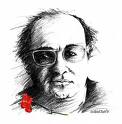It serves as a constant warning to those who seek to use the ultimate form of censorship murder to silence their critics. The Ugur Mumcu Foundation is recommending to UNESCO that the anniversary of Ugur Mumcu's death be marked by an international day of justice for those who die for the practice of their profession as writers and journalists.
International PEN fully supports this initiative as part of its own work to end impunity for those who use murder as the ultimate form of censorship world-wide.
Since Ugur Mumcu's death, at least 19 other writers and journalists have been killed in Turkey. Many were clearly murdered by those who objected to their views. Others died in circumstances which have never been resolved.
In some of the cases the killers were brought to trial and convicted. Ugur Mumcu's is a case in point. Ugur Mumcu died on 24 January 1993 when a car bomb exploded in Ankara.
A leading writer for the daily Cumhurriyet, his death led to widespread condemnation and public protests, which continue today in the form of annual commemorative events organised by the Ugur Mumcu Foundation.
A number of Islamic extremist groups made claim to the bombing. In January 2002, three Islamist militants were sentenced to death for "trying to overthrow the constitutional order and replace it with an Islamic regime" and for killing a number of pro-secular intellectuals, including journalists Ugur Mumcu and Ahmet Taner Kislali .Kisali, also a Cumhurriyet columnist, was killed in another bomb attack in Ankara on 27 October 1997.
The sentences were subsequently commuted to life imprisonment following judicial reforms in 2002 that abolished the death penalty in peacetime.
But the majority of the killings have not seen justice for the victims or their families, and a number of relatives of murdered journalists have turned to the European Court on Human Rights to find redress.
No culprit has been prosecuted for the murder of Ferhat Tepe, a 19-yearold journalist for Özgür Gündem who was abducted in Bitlis on 28 July 1993. His body was found a few weeks later and apparently bore signs of torture.
Tepe's family claimed that he had been killed by under cover agents of the state. The authorities contested this, stating that Tepe had been murdered by pro-PKK guerillas.
Yet in September 2003, the European Court on Human Rights, while not being able to comment on the family's allegations, concluded that "there had been striking omissions in the conduct of the investigation into Ferhat Tepe's disappearance and death" and ordered that compensation be paid to the family.
Similarly, the family of Özgür Gündem journalist, Kemal Kiliç, who was shot dead on 18 February 1993, obtained ECHR ruling in 2000 that the authorities had "failed to take reasonable measures available to them to prevent a real and immediate risk to the life of Kemal Kylyç". The Court ordered that the family be paid financial compensation.
The newspaper had suffered a series of attacks against its staff prior to Kiliç's murder. Kiliç himself had expressed fears for his life and had requested police protection, which was refused. In December 1993 a suspect was arrested and subsequently sentenced to life imprisonment
These ECHR rulings indicate that the Turkish authorities, despite the incredibly high number of killings of journalists in the early 1990s (fourteen reported in 1992), had not taken the threats seriously enough.
Indeed, borne out by the fact that most of those murdered were linked to opposition newspapers, there was a conspicuous reluctance to come to the aid of those who were openly critical of the authorities, suggesting that those who murdered outspoken journalists could do so with impunity.
On 8 January 1996, the death in a police cell of another young journalist, Metin Goktepe, a columnist for the left-leaning daily Evrensel marked a turning point. Goktepe had been beaten to death.
He had been arrested while covering the funeral in Istanbul of two leftist inmates themselves killed during a prison riot. His death prompted a public outcry and was highly publicised at home and abroad.
After several trials, retrials, and appeals, in January 2000, an appeals court upheld seven-and-a-half-year prison sentences for five police officers involved in the killing. A sixth officer's sentence was reduced to three and a half years.
Since Goktepe's death, the numbers of journalists killed in Turkey has tailed off with three reported killed between then and 1999, and none since then.
Yet elsewhere in the world, the murder of journalists and writers makes many countries dangerous places in which to practice the right to freedom of expression. The Committee to Protect Journalists reports that in 2003 thirty six print and broadcast journalists were killed in: Brazil, Cambodia, Colombia, Guatemala, India, Indonesia, Iran, Iraq, Israel and the Occupied Territories, Ivory Coast, Nepal, Pakistan, Philippines, Russia and Somalia. Some were killed in the line of fire. Others were deliberately targeted. The figures speak for themselves.
The hope is that Turkey will not return to the situation of the early 90s when murders of journalists was common, and will never again feature in the annual lists of deaths issued by writers and journalists' support groups.
The prosecutions by Turkish courts of some of those implicated, and the decisions of the European Court on Human Rights calling for restitution to the families of those who had died serve to underline that such murders are not tolerated.
Yet there remains work to be done in those states where killings of those who speak out continues to hinder free speech, and their murderers can act with impunity. Through world-wide monitoring of killings of writers and journalists, issuing protests and demanding that justice be done, International PEN aims to see an end to impunity for those who use murder as censorship. (NM)
____________________________
Sara Whyatt
Programme Director
International PEN
Writers in Prison Committee
9-10 Charterhouse Buildings
London EC1M 7AT U.K.
Tel: +44 (0) 20 7253 3226
Fax: +44 (0) 20 7253 5711
Email: [email protected]





